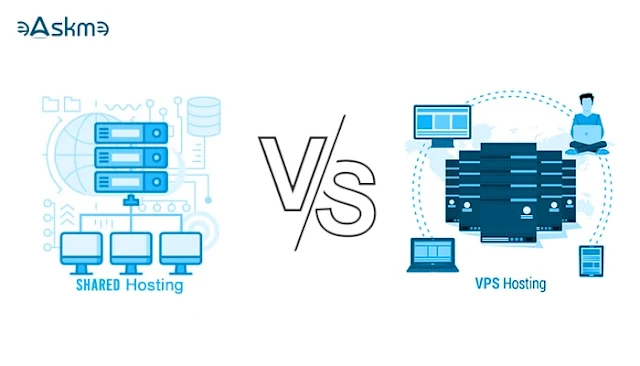The success of any website is based on three factors: robust web design, SEO, and reliable web hosting. A dependable and high-performing web hosting plan is essential for your digital presence. There are different web hosting options based on your skill set, budget, and website.
 |
| VPS Hosting vs. Shared Hosting: Which is the Best for Your Business?: eAskme |
The two most commonly known types include VPS and Shared hosting.
Which one is better between the two options?
Here is a detailed comparison to help you analyze which will best suit your needs.
What is VPS Hosting?
VPS stands for Virtual Private Server hosting.
In this hosting plan, a single commercial server hosts multiple virtual machines (VMs).
It splits the server into VMs using the virtualization principle with the Hypervisor software.
These VMs are isolated from each other, emulating the functionalities of a server. It has dedicated CPU resources, memory, an operating system, and other configurations.
The virtual servers also have an IP address and provide users with root access.
While the VPS hosting accounts share the same infrastructure, the virtual isolation ensures that your site is not affected in any way.
It thus simulates the characteristics of a dedicated server at much lower costs.
Pros of VPS Hosting:
Good Neighborhood:
VPS hosting installs a privacy fence.
The activities of other VPS accounts, including their traffic and security issues, will not impact your performance.
Root Access:
The vendor will take care of server hardware management.
But root access allows you to choose the software to install the desired OS and applications.
Scalability:
You can ask the vendor to adjust the VPS limits in a hypervisor-based on your current needs.
Thus, you can tune the VPS resources to your demands if you expect more seasonal traffic.
Value-based pricing:
VPS hosting is highly cost-effective, thus delivering the best price-to-performance value.
At an affordable price, you get features similar to a dedicated server.
Security:
VPS hosting is a secure hosting option.
Since your VM is isolated, your virtualized environment is unaffected if your neighborhood faces cyberattacks.
It cannot breach your security.
You can boost security by integrating other security-hardening protocols.
Customized Services:
You can configure the virtual server by allocating the server resources. You can define the bandwidth levels, RAM, and storage for your VM.
Cons of VPS Hosting:
The primary disadvantage of VPS hosting is that it is more expensive than shared hosting.
But, it is more cost-effective than dedicated hosting.
Compared to dedicated hosting, there are limitations on the allocated resources to power resource-hungry applications.
Since VPS hosting offers control only over the partition of resources and not the entire server, the security may be compromised.
But it is more secure than shared hosting.
What is Shared Hosting?
As the name suggests, a single server is utilized by multiple websites in shared hosting.
These websites share the resources.
As per their hosting plan, they are allotted a share of resources.
It is typically recommended for smaller sites that do not face much traffic.
Pros of Shared Hosting:
Economical:
Shared hosting is the most cost-efficient of all hosting plans.
It is the right plan for new websites that expect low to moderate traffic.
Simplicity:
The built-in cPanel enables easy management.
The cPanel dashboard helps set up email add-on domains more quickly.
Less technical expertise required:
You don’t require much experience with server administration.
It is easier to administer and manage shared hosting.
There is a standardized setup, making it a more beginner-friendly solution.
Cons of Shared Hosting:
- Due to limited resources, the website risks downtime in shared hosting.
- Since multiple websites share the same server and resources, it is more prone to security issues.
- You do not get root access to the server.
- Limited customization options are available for shared hosting.
Which one is better: Shared or VPS Hosting?
Security and Performance:
While both hosting types are secure, shared hosting is more vulnerable to breaches than VPS. It is because multiple accounts share resources and are not isolated.
Moreover, if other sites face higher traffic and eat more shared bandwidth, it may affect your site’s performance.
Control:
VPS hosting, unlike shared hosting, provides you with root access.
On the other hand, shared hosting offers a more straightforward, standardized setup.
Server Administration:
Resource management in VPS hosting is more complicated.
But you can effectively customize and configure it with the help of your vendor to serve your needs.
Scalability:
VPS hosting offers more scalability than shared hosting.
Conclusion:
Regarding resources, effectiveness, and security, VPS hosting is a better option than shared hosting.
But, if you are new to web hosting and require few resources to begin within a limited choice, shared hosting can be adequate.
If you still have any question, feel free to ask me via comments.
Share it on Facebook, or Twitter with your friends and family.
Don't forget to like us FB and join the eAskme newsletter to stay tuned with us.
Other Handpicked Article for You:









